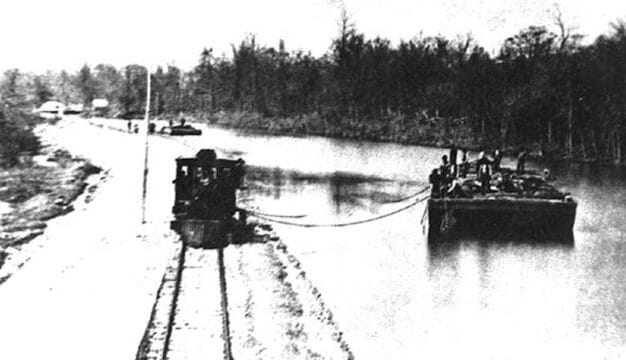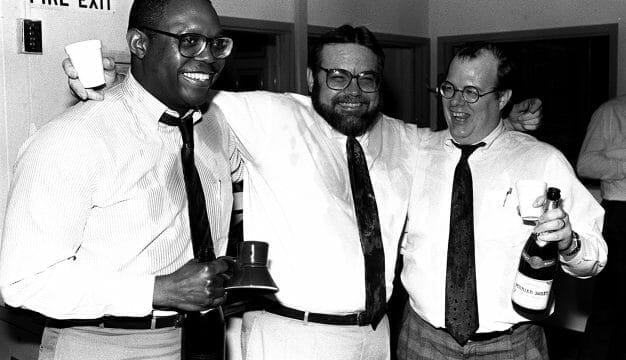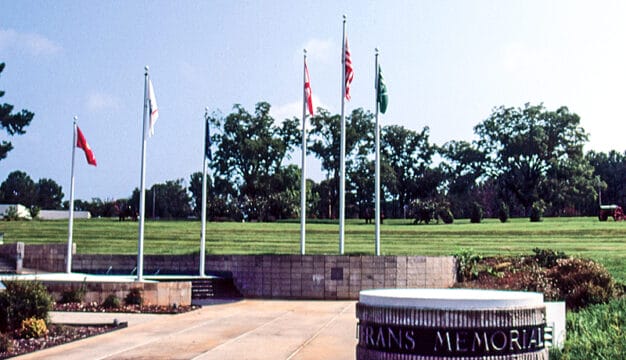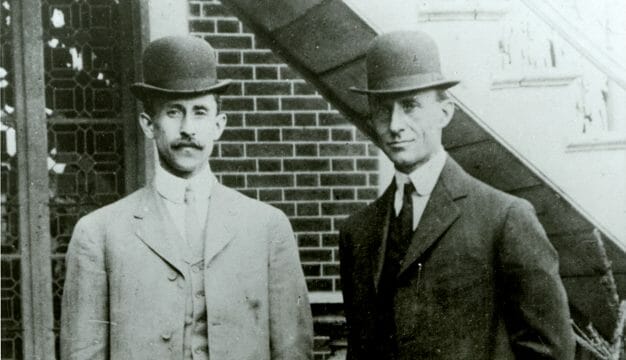Albert Lee Smith Jr.
Albert Lee Smith Jr. (1931-1997) represented Alabama‘s Sixth Congressional District in the U.S. House of Representatives from 1981 to 1983. Smith was a conservative and a member of the Republican Party. Like many conservatives of the late twentieth century, he supported lower taxes and smaller government. Smith was active in many civic, political, and religious organizations in his home community of Birmingham, Jefferson County, including the Kiwanis Club, the John Birch Society, and Campus Crusade for Christ.
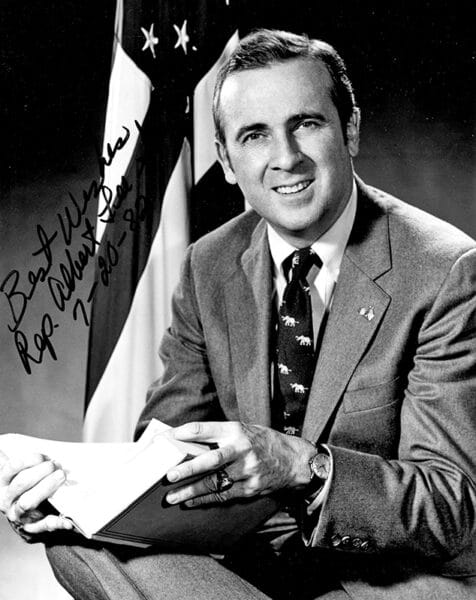 Albert Lee Smith Jr.
Smith was born in Birmingham on August 31, 1931, to Albert Lee Smith and Margaret Howard Smith; he had one sister. In 1949, he graduated from Birmingham’s Ramsay High School, which was named for industrialist and education supporter Erskine Ramsey. In 1954, Smith earned his bachelor of science from Alabama Polytechnic Institute (present-day Auburn University) in Auburn, Lee County. He then served in the U.S. Navy from 1954 to 1956. After his time in the Navy, Smith returned to Birmingham and joined Jefferson-Pilot Life Insurance Company and worked for 41 years as a Chartered Life salesmen. During his time at Jefferson-Pilot, Smith served as the president of the Birmingham Association of Life Underwriters. Smith was also active in the First Baptist Church in Birmingham and served as a deacon for many years. He was married to Eunice W. Smith.
Albert Lee Smith Jr.
Smith was born in Birmingham on August 31, 1931, to Albert Lee Smith and Margaret Howard Smith; he had one sister. In 1949, he graduated from Birmingham’s Ramsay High School, which was named for industrialist and education supporter Erskine Ramsey. In 1954, Smith earned his bachelor of science from Alabama Polytechnic Institute (present-day Auburn University) in Auburn, Lee County. He then served in the U.S. Navy from 1954 to 1956. After his time in the Navy, Smith returned to Birmingham and joined Jefferson-Pilot Life Insurance Company and worked for 41 years as a Chartered Life salesmen. During his time at Jefferson-Pilot, Smith served as the president of the Birmingham Association of Life Underwriters. Smith was also active in the First Baptist Church in Birmingham and served as a deacon for many years. He was married to Eunice W. Smith.
An active member of the Republican Party since 1962, Smith served as an Alabama delegate to the 1968, 1972, 1976, and 1984 Republican National Conventions. He was an unsuccessful primary candidate against incumbent Rep. John Hall Buchanan Jr. in 1978 but defeated the more moderate Buchanan in the subsequent 1980 primary and narrowly won the general election. Newspaper accounts say his campaign was aided by the politically and religiously conservative Moral Majority organization, whose local members drove voters to the polls. Smith was part of the tide that elected Adm. Jeremiah Denton Jr. to the U.S. Senate on a campaign of conservative social values and increased national security.
Smith served as a congressman from 1981 to 1983 and sat on the House Budget Committee and Committee on Veteran’s Affairs. Known as a strong backer of Pres. Ronald Reagan’s economic, social, and anticommunism rhetoric and policies, Smith supported tax cuts, conservative social policies, and increased national defense spending. During his term, he sponsored the failed Family Protection Act, which proposed tax credits for religious schools. Smith cosponsored several veterans’ benefits bills, including the Veterans’ Health Care, Training, and Small Business Loan Act of 1981, which became law. For his efforts, Smith was awarded the Taxpayers Best Friend Award by the National Taxpayers’ Union, the Leadership Award by the American Security Council, and the Golden Bulldog Award by the Watchdog of the Treasury. Smith was defeated in his reelection bid by Jefferson County commissioner and Democrat Ben Erdreich in 1982. Erdreich was aided by the large turnout of African American voters, including many who had lost jobs in the steel industry and were unhappy that Smith did not support extending unemployment benefits. Smith was likewise unsuccessful in the 1984 Senate contest in which Democrat Howell Heflin was overwhelmingly reelected. After Smith left Congress, he was appointed by Reagan to the Federal Council on the Aging in 1985.
Smith was a long-time member of the Southern Baptist Convention and was elected to the Baptist Joint Committee on Public Affairs. In that capacity, Smith was tasked with looking into student life at Baptist-affiliated Samford University in the 1990s. In fact, his family had long-been connected to the institution where his grandfather, Albert Durant Smith, and his father, Albert Lee Smith Sr. both taught. In the early 1990s, the Convention became concerned over student activities when university president Thomas E. Corts allowed dancing on campus. This was a decision fundamentalist Baptists like Smith opposed because they believed it promoted sexual promiscuity. Student alcohol consumption also alarmed the Convention despite Samford remaining a “dry,” or alcohol-free, campus. In addition, the Convention denounced the writings and classroom instruction of some Samford faculty members in the Beeson Divinity School who departed from customary Baptist teachings on the Bible. Smith led an unsuccessful campaign to convince Corts to remove these faculty members he perceived as being too liberal.
On August 12, 1997, Smith died in Birmingham and was interred in Elmwood Cemetery.
